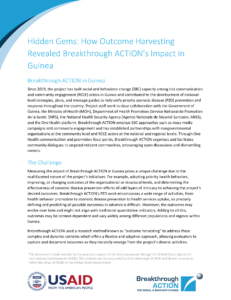This success story highlights Breakthrough ACTION’s transformative impact on social and behavior change (SBC) in the context of zoonotic disease prevention and response. Since 2019, the project has worked closely with key stakeholders such as the Government of Guinea and the Ministry of Health to build capacity and develop national-level strategies for unified action against priority zoonotic diseases. However, measuring the impact of such a multifaceted project posed a unique challenge due to the complexity and dynamic nature of activities. To overcome this challenge, Breakthrough ACTION employed a flexible and adaptive monitoring and evaluation approach known as outcome harvesting. By retrospectively identifying and verifying changes influenced by the intervention, Breakthrough ACTION captured the intended and unintended outcomes of project activities, providing a comprehensive understanding of its impact. Interviews with stakeholders demonstrated tangible successes, such as transforming community messaging approaches, enhancing journalist capabilities, and significantly increasing vaccine coverage through community dialogues. The widespread acknowledgment of Breakthrough ACTION’s effectiveness underscores its crucial role in advancing social and behavior change in Guinea and beyond.
This website was originally developed by Breakthrough ACTION (USAID Cooperative Agreement #AID-OAA-A-17-00017) under the leadership of Johns Hopkins Center for Communication Programs. This website is now maintained by Johns Hopkins Center for Communication Programs and its contents are the sole responsibility of CCP. The contents of this website do not necessarily reflect the views of USAID, the United States Government, or Johns Hopkins University.
© Johns Hopkins University. All rights reserved.


